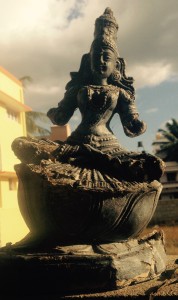Book now
Mysore style astanga self-practice
Mon-Fri 6.15-9am (last entry 7.30am)
Sat 7.30am start (led class last Saturday of each month)
Led Classes
Monday 6pm, Wednesday 6pm & Thursday evenings 7.30pm
Friday evenings 6pm
The world news is full of dark stories and fears for a dystopian future. How can we respond when we feel real fear about what is happening, for example in British or American politics?
In fact these news stories are as old as time itself: Friends and foes, wars for territory, the fear of ‘the other’ and the unknown.
The Bhagavad Gita, which is part of the epic poem of the Mahabharata, tells the story of Arjuna, a great warrior (representing the human soul seated in the chariot of the body), who feels he cannot fight and is counseled by Krishna (the inner spirit). As the introduction to ‘The Living Gita’, which translates the story, explains:
“Today we see humanity divided against itself and threatened with nuclear war and mutual destruction. No political means are adequate to deal with this problem, and many are driven todespair. It is then that the message of the Gita comes to teach us that it is only when we rise above human schemes and calculations and awake to the presence of the indwelling Spirit that we can hope to find an answer to our need.”
The Gita describes the way that one might be feeling because of events that we feel we cannot control: “Anger confuses the thinking process, which, in turn, disturbs memory. When memory fails, reasoning is ruined. And when reason is gone, one is lost”.
But that “the yogi who has disciplined the mind and has control of the senses can move about amidst sense objects, free of attraction and aversion, settling more deeply in tranquility. In that tranquility all sorrows fall away (because) the discerning intellect of a calm mind is soon secure in equilibrium.”
Divisive politics are tackled because, while it might be tempting to use words such as “evil” to describe world leaders or political choices made that affect us, in reality it gets us nowhere: “A person stands supreme who has equal regard for friends, companions, enemies, natural arbiters, hateful people, relatives, saints and sinners.”
 In the Living Gita, it is explained that behind each label of a person is still ‘the real Self’ – an example is a clear lightbulb compared with a coloured lightbulb. The coloured lightbulb gives coloured light but one wouldn’t say that the electricity inside is any different. The energy that runs through all the bulbs is the same. While it is tempting to say “well of course”, we can easily let ourselves become caught up in the anger and the rhetoric of the news bulletins.
In the Living Gita, it is explained that behind each label of a person is still ‘the real Self’ – an example is a clear lightbulb compared with a coloured lightbulb. The coloured lightbulb gives coloured light but one wouldn’t say that the electricity inside is any different. The energy that runs through all the bulbs is the same. While it is tempting to say “well of course”, we can easily let ourselves become caught up in the anger and the rhetoric of the news bulletins.
So does this mean that we just remain passive and let things worsen, as we see it? And what about our mind, that might be calm one minute but then anxious or angry again? Arjuna asks Krishna: “You say that equanimity of mind is Yoga. But I do not see how that is possible, because the mind by nature is constantly changing […] Trying to control the mind is like trying to control the wind.”
The answer is simple, it’s just that we continually forget and need to remind ourselves in these turbulent times: “The Lord said: O mighty Arjuna, undoubtedly the mind is restless and very difficult to control. But with steady yoga practise (abhyasa) and non-attachment (vairagya) it can be controlled.”
Like Arjuna, we are all on the battlefield, constantly fighting to win the game. It’s not just a one-time war (or a one time political election!) Don’t think that if peace comes somewhere on the globe there is peace in your heart; the war is continually going on. The body and mind are a constant battlefield. Now and then Krishna reminds us: “Don’t give up. Fight with proper understanding; then you can win the war.”
So today and each day, step away from the world news, take a deep breath and begin your practice in whatever form it takes.
By Anna Jones
Mon-Fri 6.15-9am (last entry 7.30am)
Sat 7.30am start (led class last Saturday of each month)
Monday 6pm, Wednesday 6pm & Thursday evenings 7.30pm
Friday evenings 6pm